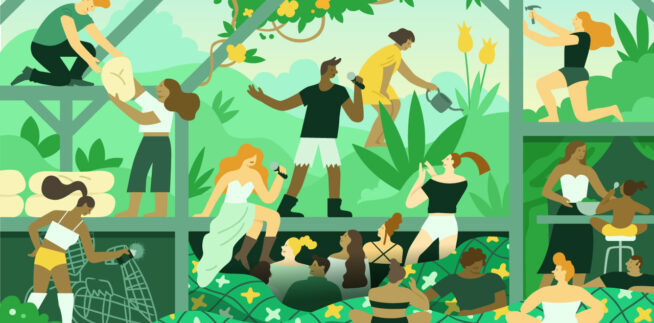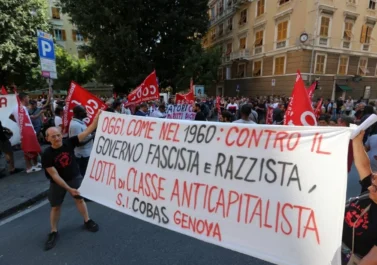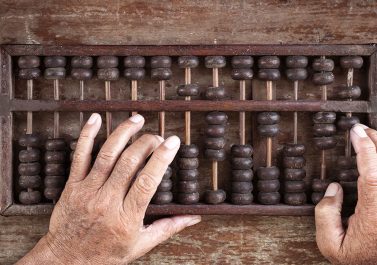
We want to document a short exchange with dear comrades in Australia on the question of mutual aid. They had published an article on the issue and asked us for our opinion. We have published related articles on local mutual aid experiences during the Covid pandemic and with a local solidarity network in west-London.
——
Dear Comrades,
Thanks for your letter about your recent article on mutual aid. Most of us in Angry Workers have come together quite recently. Because of covid some of us have not even yet met each other in person, only on zoom and we are coming from very varied backgrounds. I spent the 1960’s – 90’s as a trade unionist factory worker and in a trotskyist party. I’m pointing this out as there might be some slightly different responses to your article from different Angry Workers.
In general I agree with your comments but would just like to add some things which could be paraphrased as ‘don’t throw the baby out with the bathwater’. Simply because most of what passes as ‘mutual aid’ does little to develop the fighting capacity of the working class don’t reject the concept out of hand and always be on the lookout for when circumstances mean that ‘mutual aid’ can help build class independence.
I’ll give a couple of examples from my own experience.
The 1984 British Miners Strike.
In 1984 the British miners were pushed into an all-out strike by the Thatcher government who had spent many years preparing for this decisive battle which for them was necessary to put an end to the post war militancy of the trade union movement. This was a strike provoked by the government’s decision to close mines but underneath it was an all out showdown with the whole trade union movement.
From day one it was clear to the miners that this was going to be a long battle. The miners union bank accounts were frozen by the government under new anti-trade union laws so how were the miners to finance themselves in a long strike? How were they and their families to survive?
Workers throughout the country began to donate money but even more importantly the mining communities set up massive projects both to feed the miners and their families and also to provide them with clothes, Christmas present for the kids etc etc. All across the country other people joined in this effort to prevent the miners being starved back to work. Food was collected and taken to the mining areas and around this activity miners’ support groups were set up everywhere. For a year 100,000 miners and their dependents were supplied with the means to survive.
I think this solidarity, this mutual aid, was essential and certainly did strengthen the class. It also had it weakness which in a sense was the political weakness of the class as a whole of that time.
Thatcher had prepared for this strike by bringing in laws which forbade solidarity strikes making it certain that other trade unions would be bankrupted if any of their members took solidarity action with the miners, but it was exactly such solidarity action that was essential if the miners were not going to be defeated. The longer the strike went on the more the government organised alternative energy supplies both from abroad and from those mines that were scabbing on the strike. Only a wider strike movement could have toppled the government. The rest of the union leadership were scared of losing their money, jobs, cars etc. The miners’ union leadership, militant as they were, chose not to confront the treachery of the other unions, ultimately sharing their reformist politics.
So most of the striking miners’ energies went into trying to stop production at the scabbing mines, leading to violent battles with the state, and all the energies of their supporters went into keeping them fed and alive. Little was done to spread the strike to other workers and after a year the miners went back to work, beaten.
So the food and resource providing might be seen as having helped keep the strike alive but in an unwinnable battle and helping to hide what really need to be done. However, I think that would be the wrong conclusion. The food collecting was essential. The strike couldn’t have lasted a month without it, the weakness was in the outlook of the class in general and in its so called ‘revolutionary’ ranks in particular. If a political movement to spread the strike beyond the mines was to have been successful it could really only have come from the heart of that existing movement of food solidarity. This was were all the best elements of the class were coming together.
So the mutual aid aspect was vital but, as always, what was important was what was going on inside that mutual aid campaign. Does it stop there, just providing the necessary means to survive, or does it try to advance the battle on new fronts?
Workers Aid for Bosnia. 1993
In 1992 war broke out in Yugoslavia. In the midst of the war the industrial and mining town of Tuzla, in Northern Bosnia, came under siege. The miners and other workers had seized weapons from the local military base and had established defence front lines round a large territory in which people from all of Bosnia’s ethnic backgrounds lived together. This was the region with Yugoslavia’s most inter-married society and the workers were intent on defending this society from the ethnic cleansing troops of the Croatian and Serbian nationalists.
In the UK a group of us set up Workers Aid for Bosnia. You can watch an interview I did about this on labournet.tv, this is just a short summary. Unable to overcome the defensive lines around the Tuzla region the ethnic cleansers were seeking to use hunger to defeat the city.
The war, the ethnic cleansing, had a big impact on people throughout western Europe. People were horrified and we were able to turn this mood into practical actions. We took convoys of trucks filled with food and people and, after months of trying to find a way in, got to the besieged town and delivered the supplies to the miners’ union and other workers’ organisations. We kept these convoys going throughout the war.
Of course all kinds of do gooders, religious organisations and NGO’s were doing something, that on the surface looked the same as us. Indeed many of the volunteers who went on our convoys might equally have joined one of those other actions. But at every point we were trying to develop an action of working class internationalism and practical solidarity. We got our money and food from work places and working class communities. We stressed the worker to worker nature of our campaign. We stressed the political aims – we didn’t want to feed hungry people, we wanted to give strength and a voice to the working class elements within the cross-class defence within Bosnia. The convoys went alongside a political campaign of getting delegations out of Bosnia to do speaking tours across Europe. We refused to register as a charity which would have helped us financially but would have prevented our political campaign. We refused to co-operate with the UN which would have made our journeys across front lines easier but would have helped boost the UN’s ‘aid’ face which was just a camouflage for its support for ethnic division. At all times we stressed we were not neutral in the war, we were taking the side of the working people trying to stop ethnic division of their city.
All the time our efforts we directed at trying to provoke a wider working class response, not simply to build our campaign which by itself was always going to be limited. And to some extent we succeeded.
The destructive nature of capital threatens the future of humanity.
We do not live in a world where things will just go on until the working class finds its strength to change society. The rule of capital threatens the destruction of the conditions for life. Practical solidarity becomes vital. Think of Syria. We cannot simply say ‘we need to overthrow capital to solve problems’. The development of a revolutionary class will, along the way, have to more and more try to take responsibility for the well being of its own. So in a sense I applaud, for example, the people who go and try to help refugees, or medics who volunteer for MSF or people who, during the pandemic, went shopping for the people who couldn’t go out. These and a thousand other actions are exactly the kind of potential building blocks of class solidarity. Where they fall down, as you outline very clearly, is their political perspectives, above all their lack of a conception of class, of the need to develop the independent actions of the class. But in essence their ‘mutual aid’ aspirations are a starting point.
I don’t think what I’ve said is in any way contradictory to what you have written. But I am so aware of the ‘left’s’ idea that passing resolutions, writing thesis etc etc is somehow a revolutionary practice. It isn’t. Revolution and the development of a revolutionary class is above all a practical task – how to lay hands on and control human production and on the way how to stop the destructiveness of capital making life impossible for people.
I used to turn my political nose up at ‘charity’, saying the government should provide this or that facility, don’t do what they refuse to do. But how can you say that in a situation like Syria or in Brazil right now with covid? Capital will allow millions to die. We communists have to try to propose ways in which workers can oppose this and by so doing strengthen their own organisation, their own conception of their strength, their own hatred of capital and its representatives. And in the right circumstances with the right political perspectives maybe even servicing people’s bicycles can do that! And remember that if the radical workers movements don’t take responsibility for the well being of the class others will. Why was it so easy for the mullah’s in Iran to come out on top of the Iranian revolution? Well one of the reasons was the mosques had spent years developing their ‘social welfare’ programmes making people both dependent and grateful to the Islamic cause.



